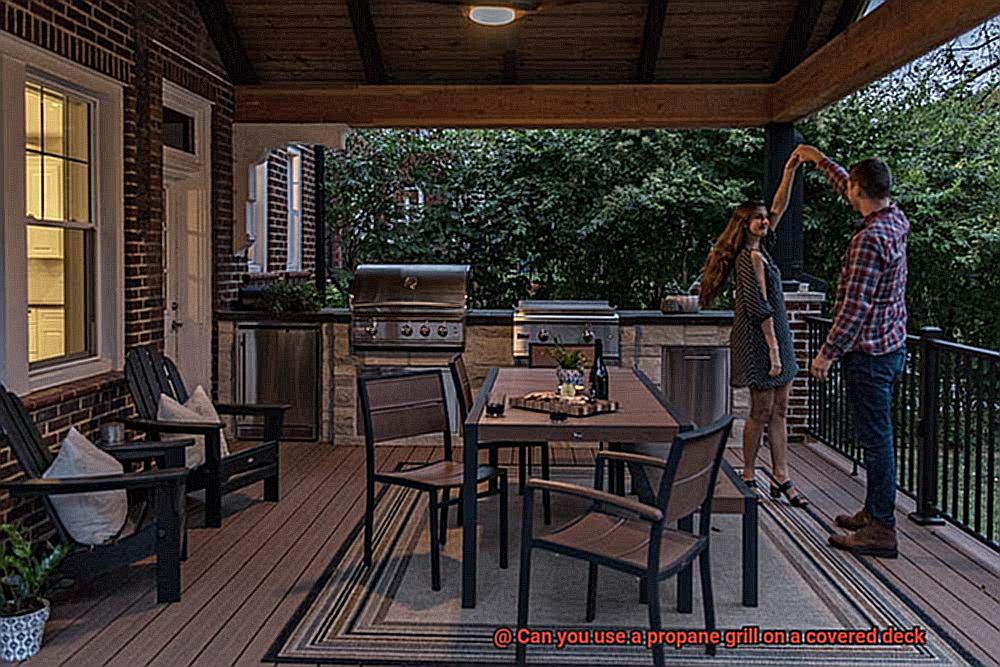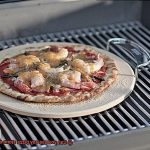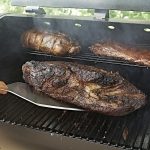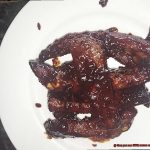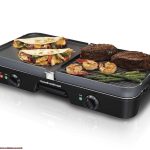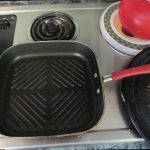Imagine this: It’s a beautiful summer evening, and you’re surrounded by your closest friends on your deck. The smell of sizzling steak fills the air, and the sound of laughter echoes around you. Suddenly, you catch a whiff of gas and start to panic. “Can we even use a propane grill on a covered deck?” you wonder.
Grilling on a deck is a quintessential part of summer for many homeowners who love spending time outdoors. But when it comes to propane grills and covered decks, safety concerns arise. Even the most experienced grill masters can feel hesitant about the possibility of gas leaks or fire hazards.
So, can you use a propane grill on a covered deck? The answer is yes, but there are several factors to consider. In this blog post, we’ll dive deep into the safety measures you should take while using a propane grill on a covered deck. We’ll discuss important points such as proper ventilation, the materials used in your deck’s construction, clearance requirements between the grill and ceiling, and more.
Whether you’re an experienced grill master or just starting out, it’s crucial to know the do’s and don’ts of using a propane grill on a covered deck. So let’s get cooking – but first things first. Let’s make sure we’re doing it safely.
Contents
What are the Regulations for Propane Grilling on a Covered Deck?
If you love grilling outdoors, a covered deck can be a great place to do it. However, before you fire up your propane grill, it’s important to be aware of the regulations and guidelines you need to follow to ensure your safety and the safety of those around you.
First things first, check your local building codes and regulations to see if there are any restrictions on using a propane grill on a covered deck. Some areas may have specific rules or limitations on where grills can be used, especially in multi-unit buildings or apartments. Don’t risk getting fined or causing damage to your property by overlooking this step.
Assuming propane grilling is allowed on your deck, the National Fire Protection Association (NFPA) recommends that propane grills should not be used on combustible decks or balconies unless there is at least a 10-foot clearance from the building. This means that if your covered deck is less than 10 feet away from your house or any other combustible structure, you should not use a propane grill on it. Keep in mind that these guidelines are designed to prevent fire hazards and ensure your safety.
Once you’ve determined that your deck meets the necessary clearance requirements, it’s important to take additional precautions when grilling on a covered deck. Make sure that your grill is stable and secure before lighting it up, and never leave it unattended while in use. Keep a fire extinguisher nearby in case of emergencies, and make sure that your propane tank is stored properly, away from any heat sources or open flames.
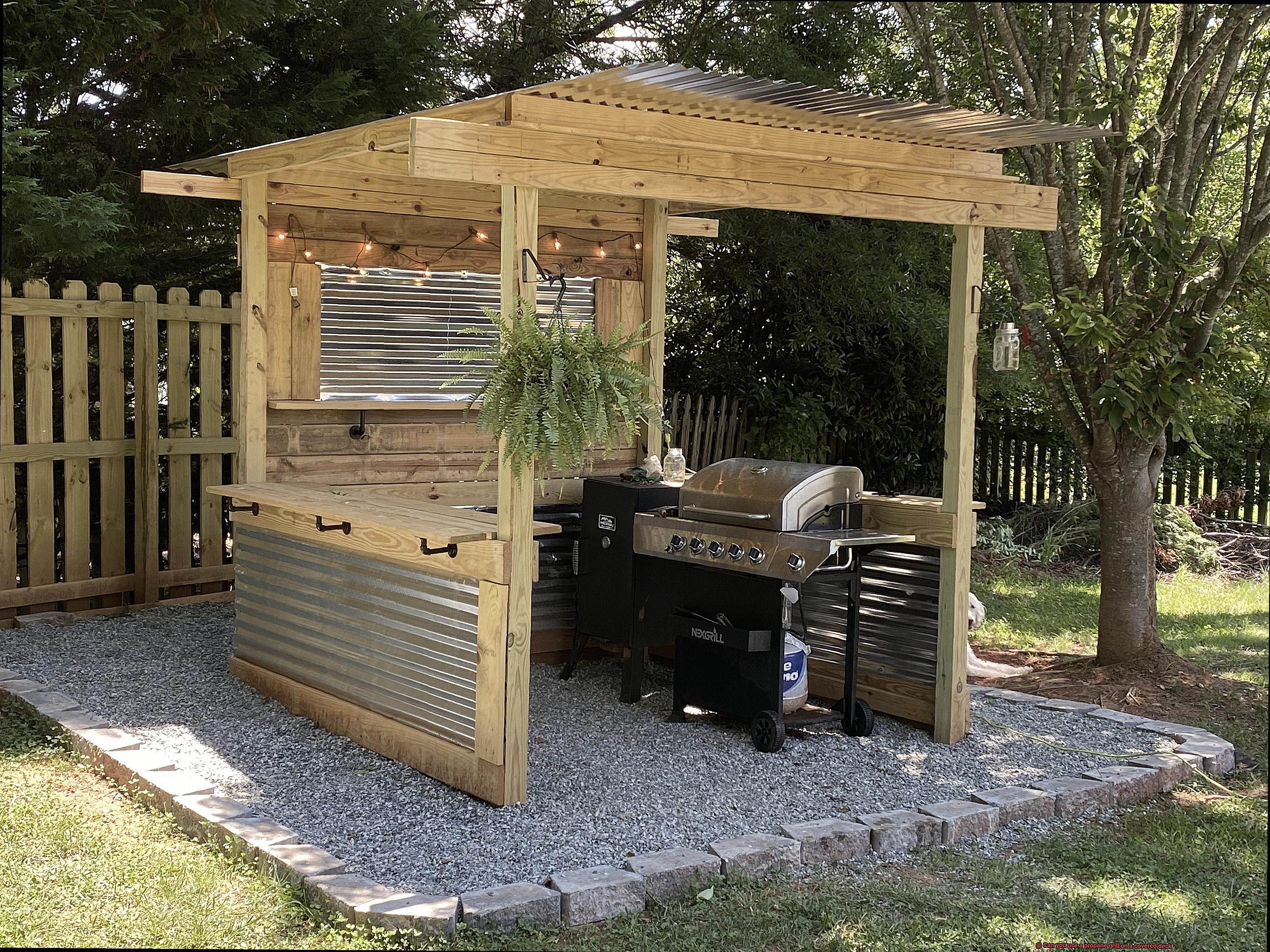
Using a protective barrier like a grill mat can also help protect your deck from grease, spills, and heat damage. It’s an easy way to prevent unsightly stains and extend the lifespan of your deck.
Don’t forget to regularly clean and inspect your propane grill for any leaks or damage before each use. This will help keep it in good condition and ensure that it functions properly every time you use it.
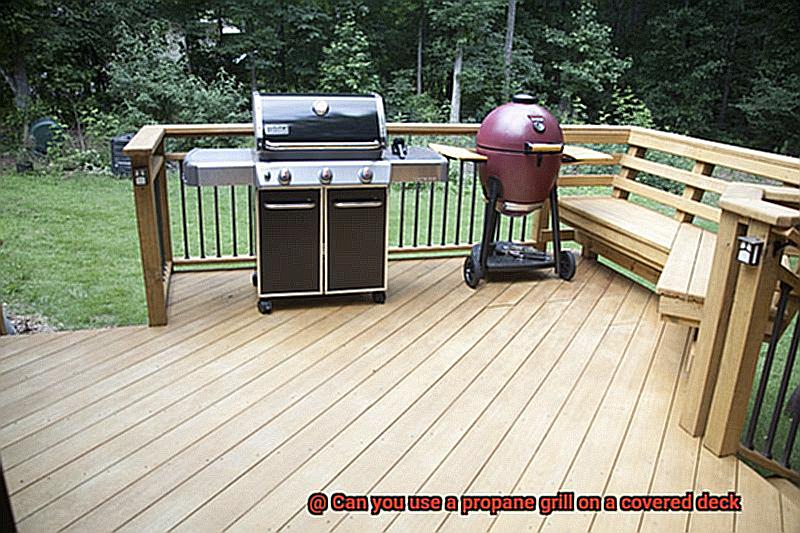
Choosing a Suitable Location for Your Grill
Before you get your apron on and start grilling, it’s crucial to choose the right location for your grill. This will not only ensure your safety but also enhance your overall grilling experience.
As an expert on this topic, I’ve compiled some essential factors to consider when selecting the best spot for your grill.
The first and most important consideration is compliance with local codes and regulations. Always check with your local authorities to ensure that propane grills are permitted on covered decks in your area. Safety should always come first.
Next, ventilation is key. Propane grills release carbon monoxide, which can be dangerous in enclosed spaces. Therefore, it’s vital to ensure that your grill is placed in a well-ventilated area with good airflow. An open-air section of your covered deck is an ideal option.
In addition to ventilation, make sure there’s plenty of clearance between your grill and any combustible surfaces such as walls or overhanging branches. A minimum of 10 feet of clearance is recommended. This will help prevent accidents and keep you and your property safe.
Another crucial factor to consider is the surface on which you’ll place your grill. It’s essential to choose a level and stable surface such as concrete or pavers. Avoid placing your grill on uneven ground or loose gravel as this can cause instability and increase the risk of accidents.
Lastly, accessibility is key. You want your grill to be easy to clean and maintain, as well as convenient for fuel or propane tank replacements. Choose a location that suits these needs and allows you to enjoy grilling without any hassle.
How to Ensure Safety when Grilling on a Covered Deck
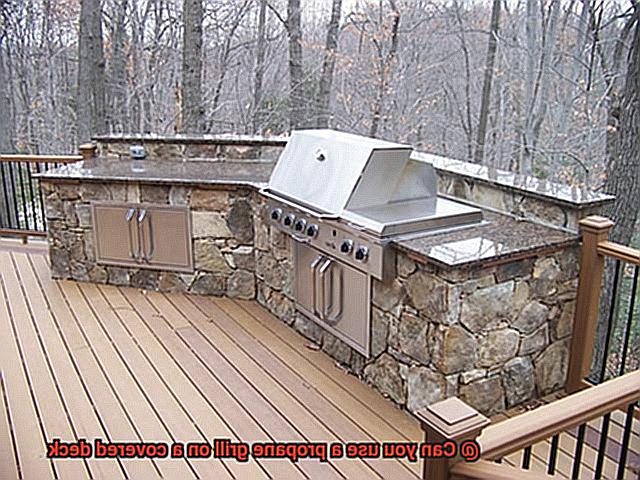
Grilling on a covered deck is a great way to enjoy the outdoors while cooking up some delicious meals. However, it’s important to keep safety in mind at all times. Here are some ways that will help ensure your safety while grilling on a covered deck:
Properly Position Your Grill
The location of your grill is crucial for safety. Make sure it’s placed on a sturdy and stable surface, away from your home and other structures on the deck. Also, keep a minimum of 10 feet of clearance between the grill and any combustible materials.
Use Quality Equipment
Invest in a propane grill that’s designed for outdoor use and has safety features such as a built-in thermometer and a safety shut-off valve. Keep long-handled tongs and a fire extinguisher nearby in case of emergencies.
Start and Maintain Your Grill Safely
Always follow the manufacturer’s instructions when starting and maintaining your grill. Ensure your propane tank is properly connected and secured, and never leave the grill unattended while in use. Also, avoid wearing loose clothing or accessories that could catch fire.
Clean and Maintain Your Grill Regularly
Cleaning your grill after each use helps prevent grease buildup, which can be a fire hazard. Inspect your grill regularly for any signs of wear or damage and replace any faulty parts.
Be Mindful of Weather Conditions
Avoid grilling during high winds or storms, as this can cause the grill to tip over or start a fire. Also, make sure your propane tank is stored upright and in a well-ventilated area.
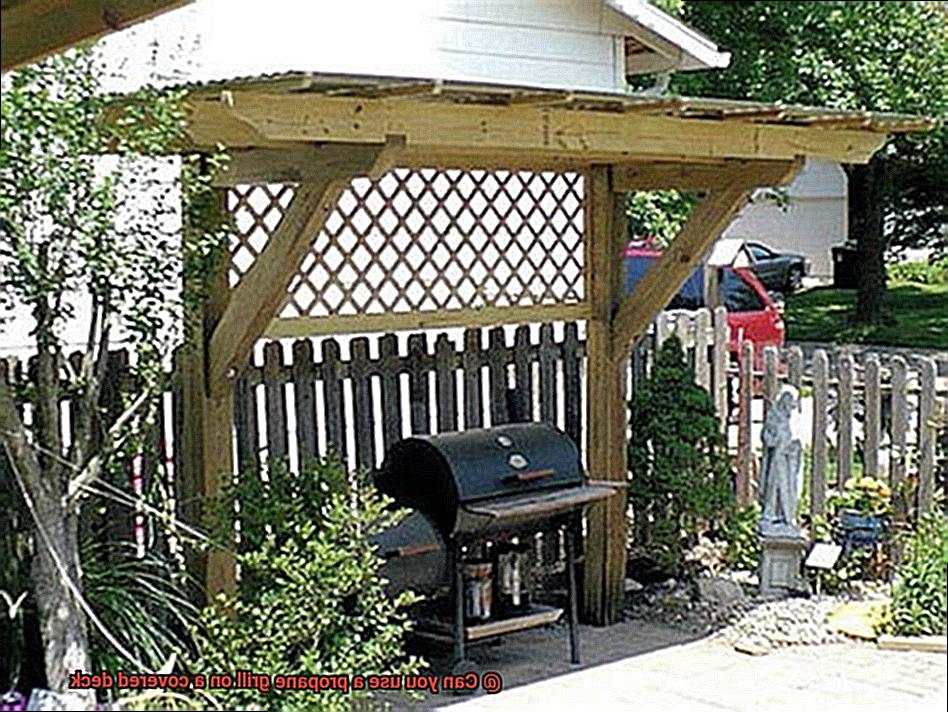
Fire Extinguishers and Emergency Preparations
Grilling on a covered deck is the perfect way to savor the warm summer weather and cook up some mouth-watering meals. However, it’s important to prioritize safety by being well-prepared for any potential emergency situations that may arise when you’re having fun.
One of the most essential things to have on hand is a fire extinguisher. This tool is your first line of defense in case of a fire and should be easily accessible and checked regularly to ensure that it’s in good working condition. A small grill fire can quickly get out of control without a fire extinguisher, causing significant damage to your home and property.
Along with having a fire extinguisher, it’s crucial to have an emergency plan in place. This entails knowing how to contact emergency services and having a designated meeting place for everyone in case of an evacuation. It’s also wise to have a first aid kit within reach for any potential injuries.
It’s worth noting that propane grills should never be used indoors or in confined spaces, as this can lead to carbon monoxide poisoning. When using a propane grill on a covered deck, make sure there is proper ventilation, and keep the grill at least 10 feet away from any combustible items such as walls or furniture.
In the event of a fire, time is of the essence; it’s vital to act quickly and safely. If the fire is small and contained, try putting it out with a fire extinguisher. However, if the fire is too large or spreading rapidly, evacuate immediately and dial emergency services.
Regular Maintenance and Inspections of Propane Grills
Before you light the flame, there’s a crucial step that should never be overlooked: regular maintenance and inspections. As an expert on this topic, I can tell you that keeping your grill in top-notch condition is essential for both taste and safety. So let’s dive into why regular maintenance and inspections of propane grills are so important.
First things first, let’s talk about cleaning. After each use, it’s crucial to clean the grates and remove any excess grease or food particles. Neglecting this step not only affects the taste of your food but also creates a potential fire hazard. Use a wire brush or scraper to remove any stubborn debris and keep your grill looking like new.
Now onto the inspections. It’s recommended to conduct these at least once a year or before the start of grilling season. This includes checking the hoses and connections for leaks or damage, inspecting the regulator for proper function, and ensuring that all valves are functioning correctly. A quick inspection can save you time, money, and potentially prevent a disaster.
If you notice any issues during your inspections, it’s important to address them promptly. This may involve replacing damaged hoses or valves, cleaning clogged burners, or adjusting the regulator. Don’t wait until it’s too late – taking care of these issues early on will save you from costly repairs or even worse accidents.
To make it easy for you, here’s a checklist to follow:
- Clean grates after each use
- Conduct annual inspections
- Check hoses and connections for leaks or damage
- Inspect regulator for proper function
- Ensure all valves are functioning correctly
- Address any issues promptly
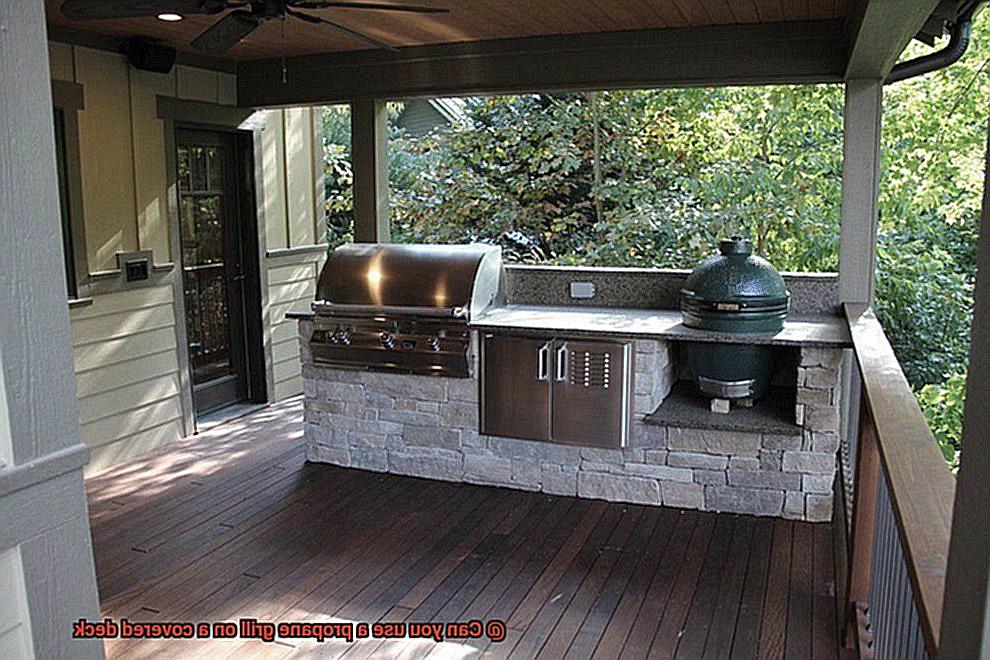
By regularly maintaining and inspecting your propane grill, you can ensure that it operates safely and efficiently for years to come. Plus, who doesn’t love showing off a shiny, well-maintained grill to their guests? Remember to always refer to the manufacturer’s instructions for specific maintenance and repair procedures.
Tips for Safely Using a Propane Grill on a Covered Deck
Grilling is one of the best ways to enjoy delicious meals during the summer months. However, before you start cooking on a propane grill on your covered deck, it’s essential to prioritize safety. Propane grills can be hazardous if not used correctly, especially in enclosed spaces. Here are some tips for safely using a propane grill on a covered deck:
Check the weight limit of your deck
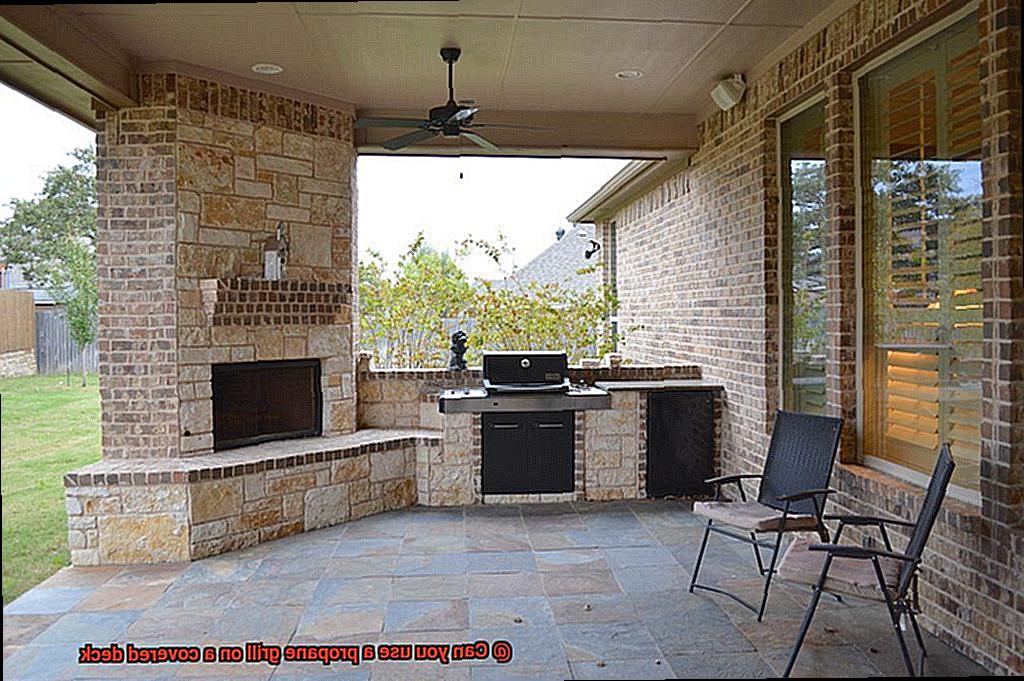
Before placing your grill on your deck, make sure that your deck is structurally sound and can support the weight of your grill. A fully loaded propane tank, combined with the weight of the grill itself, can be quite heavy. Check the manufacturer’s instructions and the weight limit of your deck to ensure that it can handle the load.
Choose a well-ventilated location
Propane grills produce carbon monoxide, which is a poisonous gas that can quickly build up in enclosed spaces. Ensure that there is enough airflow around the grill to prevent any dangerous build-up of carbon monoxide.
Keep the grill away from flammable materials
It’s important to keep your grill away from anything flammable or combustible such as overhanging branches, dry leaves or grass, and any nearby buildings or structures. Ensure that there is a clear space around the grill of at least three feet in all directions.
Keep a fire extinguisher nearby
In case of any accidents or emergencies, having an extinguisher close by can help prevent small fires from turning into significant disasters.
Never leave your grill unattended
It only takes a moment for things to go wrong, and being present and attentive while grilling can help to avoid any potential accidents.
Common Mistakes to Avoid When Grilling on a Covered Deck
There’s nothing quite like the sound of sizzling burgers and the smell of BBQ wafting through the warm summer air. Grilling on a covered deck is an excellent way to entertain guests or enjoy a family meal outdoors. However, it’s essential to take the necessary precautions to ensure your safety and the safety of your home. As an expert in this field, I have compiled a list of common mistakes to avoid when grilling on a covered deck.
Firstly, make sure you check for proper ventilation before you start grilling on your covered deck. Propane generates carbon monoxide, which can be dangerous if not adequately ventilated. Ensure that there is enough space between your grill and the ceiling of your deck or any nearby structures.
Secondly, it’s crucial to choose a grill that is the right size for your deck. A grill that is too large can be a fire hazard and take up too much space, making it difficult to move around comfortably.
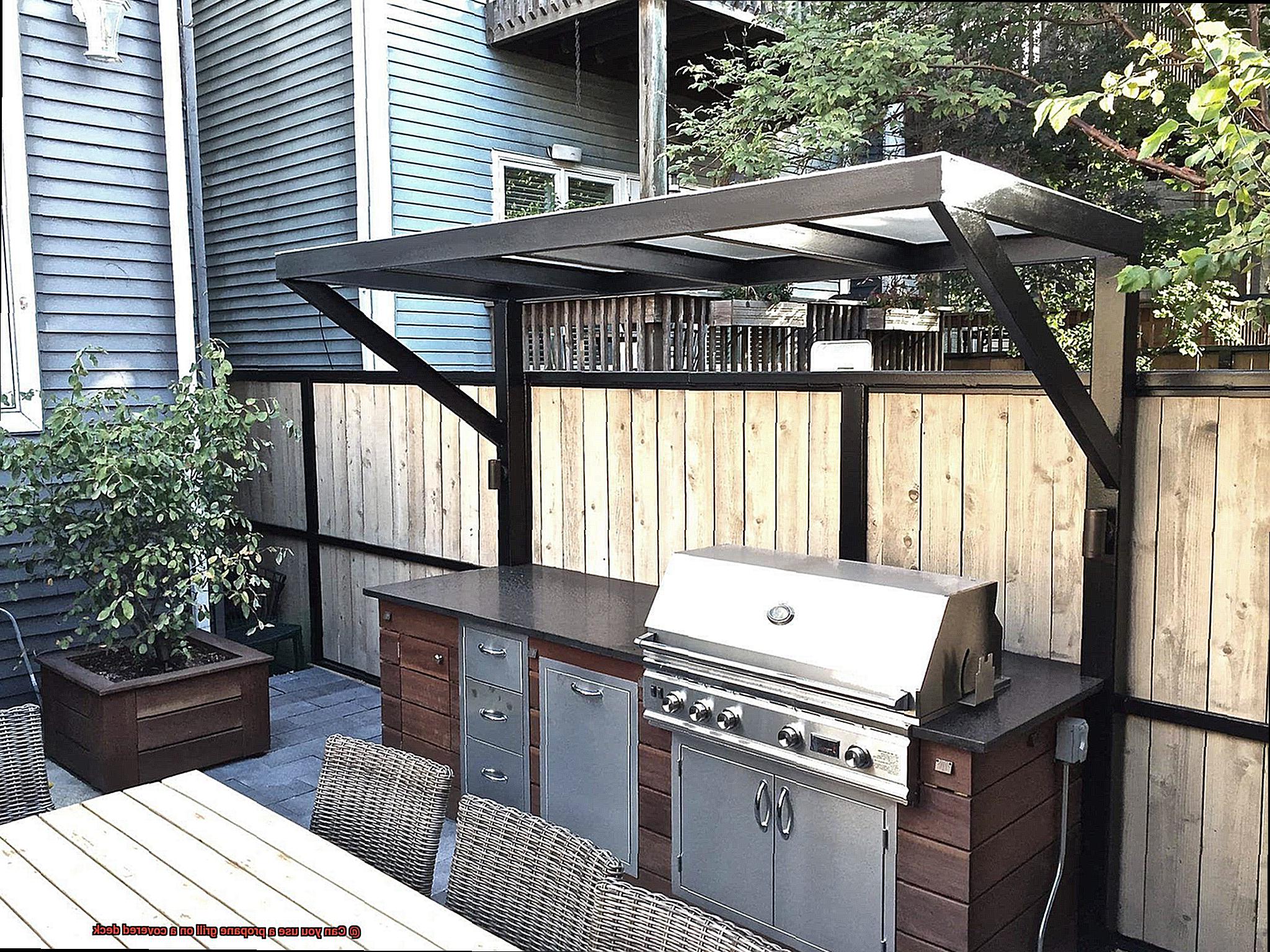
Thirdly, always use a fire-resistant mat underneath your grill. This will help protect your deck from grease and other debris that can fall from the grill and create a fire hazard. Without a mat, these materials can build up over time and create a dangerous situation.
Fourthly, keep an eye on your grill at all times when in use. Leaving it unattended for even a few moments can lead to a fire or other safety hazards. Don’t let distractions prevent you from keeping an eye on your grill.
Lastly, make sure you follow the manufacturer’s instructions when setting up and using your grill. This will help ensure that you are using it safely and correctly and can prevent accidents from occurring. Don’t assume that you know how to use a new grill without reading the instructions first.
Alternatives to Using a Propane Grill on a Covered Deck
Grilling on a covered deck can be a fantastic way to enjoy the outdoors while preparing delicious meals. However, propane grills can be risky due to potential fire hazards. Fortunately, there are plenty of alternatives to propane grilling that are just as effective and safe.
One great option is an electric grill. These types of grills are easy to use both indoors and outdoors and are ideal for those who want to avoid using gas or charcoal. They come in various sizes, and some even have removable grates which make cleaning a breeze.
Another alternative is the classic charcoal grill. While they can also pose a fire hazard, they can be used safely with proper precautions. It’s important to keep them away from the house and flammable materials and never leave them unattended while they’re lit. Charcoal grills come in various sizes and styles, including portable options for those who want to take their grilling on the go.
Lastly, there’s the option of a wood pellet grill. These types of grills use compressed sawdust and wood shavings as fuel, which gives your food a unique smoky flavor. While they may be more expensive than other types of grills and require more maintenance, they are easy to use and offer a fantastic cooking experience.
NORZ_G-2j6M” >
Also Read: Use A Pellet Grill Under A Covered Patio, Porch, Deck
Conclusion
In conclusion, grilling on your covered deck is the perfect way to enjoy the summer sun while cooking up mouth-watering meals. However, safety should always be your top priority when using a propane grill in this setting. To ensure a safe and enjoyable experience, it’s crucial to follow regulations and guidelines, choose the right location for your grill, and take necessary precautions such as proper ventilation, routine maintenance, and emergency preparations.
Selecting the appropriate equipment and avoiding common mistakes are also key factors in safe grilling. Electric or charcoal grills can be just as effective and secure if used correctly.
By adhering to these tips and guidelines, you can guarantee that you have an unforgettable grilling experience on your covered deck.

